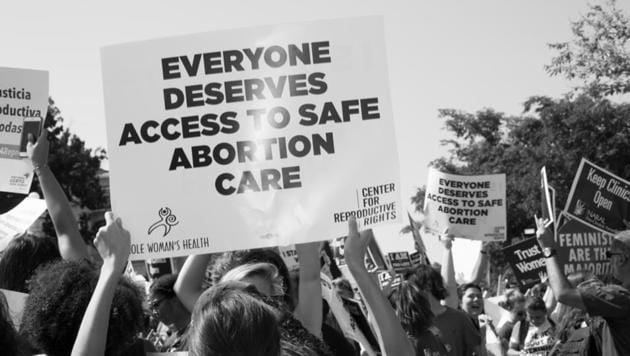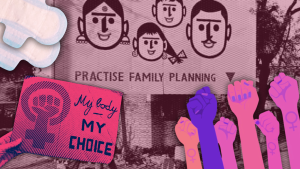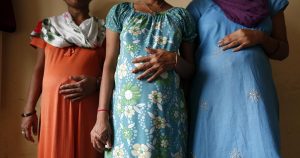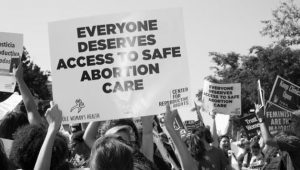Abortion Is Legal In India But Rules, Stigma Make It Hard To Access
- Shreya Raman

At 25, and into the fourth year of an abusive marriage, N*, discovered that she was eight weeks into an unwanted pregnancy. She approached a doctor at a public hospital for an abortion, and also disclosed that she had endured sustained spousal abuse.
The doctor insisted on getting her husband’s permission for the abortion. She somehow managed to get her husband to sign an informal application for the procedure, but was then asked to get a no-objection certificate from the police as well. The law does not require spousal consent or police permission for an abortion but N’s experience is not uncommon in many parts of India.
N is among the 72 women and two children interviewed for a 2019 research paper by the Centre for Enquiry into Health and Allied Themes (CEHAT), a Mumbai-based research institute. All of them were rape survivors who had sought an abortion and, of them, 57 (77%) could not get procure one.
Last week, Politico reported that the United States Supreme Court, in an initial draft opinion, has voted to overturn the 1973 Roe vs Wade judgement that legalised abortion in the country. Not only did the news set off protests across the US but also renewed the debate about abortion rights in countries across the world.
India’s abortion rights are generally perceived as being liberal but an analysis of the country’s legal framework and social attitudes show that terminating an unwanted pregnancy is still a fraught experience for a woman. The law also leaves the final decision on an abortion to medical practitioners, who themselves are not impervious to the notions of morality, shame and guilt surrounding the procedure, concluded a 2021 study conducted by the National Law School of India University.
In India, the medical termination of a pregnancy is still not provided on request. Under section 312 of the Indian Penal Code (IPC), abortion is a criminal offence but with one exception – the MTP Act. Enacted 50 years ago, it allows an abortion up to 24 weeks of a pregnancy but only under specific conditions. The act was amended last year, allowing a registered medical practitioner to medically terminate a pregnancy if she/he believes in “good faith” that its continuation could risk the pregnant woman’s life or result in “grave physical or mental injury”. The pregnancy can also be terminated if there is a substantial risk of the child being born with physical or mental “abnormality”.
In 2017, the Supreme Court said that a woman’s right to make reproductive choices is a constitutional right because it relates to her “right to privacy, dignity and bodily integrity”. Despite this, the amendment to the MTP act failed to incorporate a rights-based approach to abortion so that it still remains an exception.
The law and the overlapping mandates of the Protection of Children from Sexual Offences (POCSO) Act and the Pre-Conception & Pre-Natal Diagnostic Techniques Act, social and cultural factors and the limitations of the healthcare system mean that abortion is still not easy to access, as we detail later.
Shame, guilt and stigma
Abortion is still stigmatised in India, several studies have established.
“There is a very strong stigma attached to abortion, which emerges from socio-cultural notions and the glorification of motherhood,” Suchitra Dalvie, a gynaecologist and coordinator of Asia Safe Abortion Partnership (ASAP) told Behanbox. “As a result, it is seen as something that ‘good women’ won’t do.”
This stigma ensures silence and ignorance around the issue. In 2018, a survey conducted in Assam and Madhya Pradesh showed that nearly 62% of the 500 young women respondents believed that abortion is a “sin”. A third believed that it is not acceptable to talk about abortion and said they would stop associating with friends who sought one.
This stigma affects the thinking of medical practitioners as well, said Dalvie. “Just because there is an abortion law in the country does not mean all gynaecologists are pro-choice,” she said. “Medical education is very much about biomedical training and does not incorporate gender rights or the socio-cultural context [of medical practice].”
Medical jurisprudence textbooks are grounded in patriarchal assumptions about women’s sexual and reproductive behaviour and these reinforce the stigma around abortion, said the NLSIU report. It cites this passage from a 2014 medical textbook: “In India, criminal abortion is resorted to mostly by widows who are prevented from remarriage by social customs, by unmarried girls who have [sic] pregnant from illicit intercourse, or when family honour is at stake.”
The stigma among medical practitioners becomes apparent in the interviews conducted by the authors of the report. A leading gynaecologist in Chennai told the authors that according to her, abortions are “ethically not advisable”. A doctor in Pune maintained that a woman cannot demand an abortion because the foetus is not the “property of the woman”. The report says that some doctors also tell women that “God is watching and that they will suffer for the rest of their lives if they get an abortion”.
‘Illegal’ pregnancy
This stigma manifests in different ways for women in different situations. Married women dealing with an unwanted first pregnancy are often told that the abortion will lead to secondary infertility and are “counselled” to continue the pregnancy. Not wanting children at a particular time or seeking to space pregnancies – neither are considered legitimate reasons for demanding termination, the study found.
The situation is even more precarious for unmarried women because many practitioners consider sex outside marriage “illegal”. “Unmarried pregnancy is illegal pregnancy and in such cases we have to give police information,” the medical officer-in-charge of a community health centre in Ranchi told the authors of the NLSIU study, “How will you manage the illegal at a legal place?” the official asked.
Unmarried women are also shamed, scolded and verbally abused for their sexual behaviour, said the study.
Women with disabilities are routinely branded as incapable mothers. This, in addition to other communication and societal barriers, puts them at risk of forced abortions, we reported in November 2021.
All this means that most decisions on abortion are guided by the personal biases of medical practitioners and the stigma surrounding it.
Criminal liability
The legal framework also instills the fear of legal repercussions among medical practitioners, further impacting abortion access.
In addition to the IPC that criminalises abortion and the exception under the MTP Act, two other acts govern the access to abortion in India, as we said earlier. These are the POCSO Act and the Pre-Conception & Pre-Natal Diagnostic Techniques Act (PCPNDT), which criminalises sex determination.
“For medical practioners, denying abortion has no consequence, but if they provide abortion and it does not fall under the parameters of the act, then there is a criminal liability,” said Aparna Chandra, associate professor at NLSIU and the first author of the study on barriers to abortion.
Moreover, the POCSO and PCPNDT acts create gray areas of criminal liability for medical providers. Under section 19 of the POCSO act, doctors, who have knowledge of sexual activity between minors, with consent or otherwise, are required to mandatorily report the case to the police. Not doing so is punishable and can lead to imprisonment up to 6 months. Medical practitioners therefore end up turning away adolescents who seek abortion or any other kind of sexual and reproductive health service, said Chandra. “They say that if we provide you the service, we will have to report you to the police,” she said.
Though the PCPNDT act is aimed at tackling sex determination, it is tracked through abortion. For example, if a sex determination test shows up a male foetus and the parents decide to go ahead with the pregnancy, it counts as an offense under the act. But the crime will not be detected because the act only tracks violations through abortion.
These issues make medical providers nervous about undertaking abortions and it explains why they seek unnecessary consents and documents, as was the case with N.
In a government hospital in Mumbai, Emergency Police Reports (EPRs) are filed in “suspicious” abortion cases, which include unmarried women seeking abortion or cases where women may later file an assault case, found the NLSIU study. The law itself requires medical practioners to report abortions only in the case of a rape allegation or if the woman is a minor.
In Tamil Nadu, the study found that doctors routinely ask for permission from child welfare committees or the court for terminating the pregnancy of underage girls though the law does not ask for this.
“All this has a chilling effect on the doctors and because of this, they make women run through hoops,” said Chandra. “A single woman going to a doctor and asking for an abortion is very rarely going to be allowed to get one. The doctor will say that someone has to vouch for her. It can be a parent or a partner or if there is no one else, then the state. This is where police reporting comes in.”
Unwittingly, campaigns against female foeticide also end up affecting abortion rights, the NLSIU study found. While discussing the declining sex-ratio in Tamil Nadu with the researchers, a government official shared two presentations – one titled ‘Missing Angels’ showed emotive images of little girls, and another, was an imaginary poem, ‘I love you, Mommy’, “written” by a terminated female foetus. This kind of imagery portrays a foetus as an independent rights-bearing entity, said the study, even though under the IPC, life begins only “once any part of the child’s body is brought forth”.
Limitations of healthcare
These legal and social barriers to abortion also exist within an inadequate healthcare system that is understaffed and ill-equipped. The MTP act only allows abortion in hospitals or in settings approved by the government. The act also only allows gynaecologists with three years of experience, and MBBS doctors with specific training, to conduct the termination.
“There are around 30,000-40,000 OB-GYNs in India and though we have about 700,000 MBBS doctors, only about 100,000 are trained to provide abortion services,” said Vinoj Manning, the chief executive officer of Ipas Development Foundation, the non-profit that conducted the survey in Assam and Madhya Pradesh, “So we are looking at a cadre of around 140,000 service providers who can terminate pregnancy as per the act.”
In rural areas, there is a nearly 70% shortage of obstetricians and gynaecologists at community health centres.
The stigma, legal issues and the shortage of medical providers mean that most abortions conducted in India are illegal. As per a 2018 Lancet study, nearly 78% of the 15.6 million abortions in 2015 were conducted outside of health facilities, making them illegal as per the MTP act. However, most (73%) of these abortions are done by injesting abortion pills that can be acquired without a prescription. While this method is not completely safe – medical supervision is advised – experts say it is relatively safe.
For early pregnancies upto 12 weeks, there is no reason why somebody other than a doctor cannot supervise pill-based abortions, said Dalvie. “Nurses are also trained on how to check for pregnancy, so they do have that kind of an experience. There is no reason why a reasonable amount of supported self-management should not be possible.” The World Health Organization also recommends self-administration of medical abortion pills till 12 weeks of pregnancy.
Despite the safety of these pills, drug controllers across the country are trying to clamp down on their supply because of concerns that they will be used to abort unwanted female foetuses, violating the PCPNDT act, said Chandra of NLSIU.
“Our laws are completely behind global standards. We require everything to be under the supervision of doctors and we require it to be at facilities. Even if the doctor is prescribing the pills for consumption at home, there are all sorts of facilities that the doctor is required to maintain, all sorts of qualifications that the doctor is required to have,” she said.
The shortage of qualified doctors impacts another aspect of access to abortions. Women who are denied abortions often approach High Courts and the Supreme Court. The courts then constitute a medical board consisting of doctors with multiple specialties for advice.
In a country short of specialised doctors, this often entails multiple trips to distant tertiary centres. A lawyer told the authors of the NLSIU study about a client who had to withdraw her plea for a late abortion because the board demanded several visits though the family lived far from the hospital.
“Every day, [the Board] would only do one examination and they kept asking them to come back,” said the lawyer, “[They] were so fed up, they had called me about it, and at the time I [told them] “Listen you have to, I do not know what else to do” –and then eventually they stopped going to the board and they stopped answering my calls. So, the case had to be withdrawn because I had no instructions.”
Doctors also tend to be judgemental about women seeking an abortion: a senior gynaecologist told the authors of the study this: “We leave our big OPD [out-patient department] aside and concentrate on one woman who had forgotten that she had a child [sic] inside her for 4-5 months. We internally decided [that] she can wait for 3 more days for the board to respond.”
For safe abortion to become a reality for women, three aspects need to be addressed said Manning. “One is to get providers at the periphery trained, the second is to improve awareness about the legality of abortion and create pathways for women to come and get abortion services and third is to find ways to normalise abortion so that the stigma is not there,” he said.
(*Name changed to protect identity)
We believe everyone deserves equal access to accurate news. Support from our readers enables us to keep our journalism open and free for everyone, all over the world.




